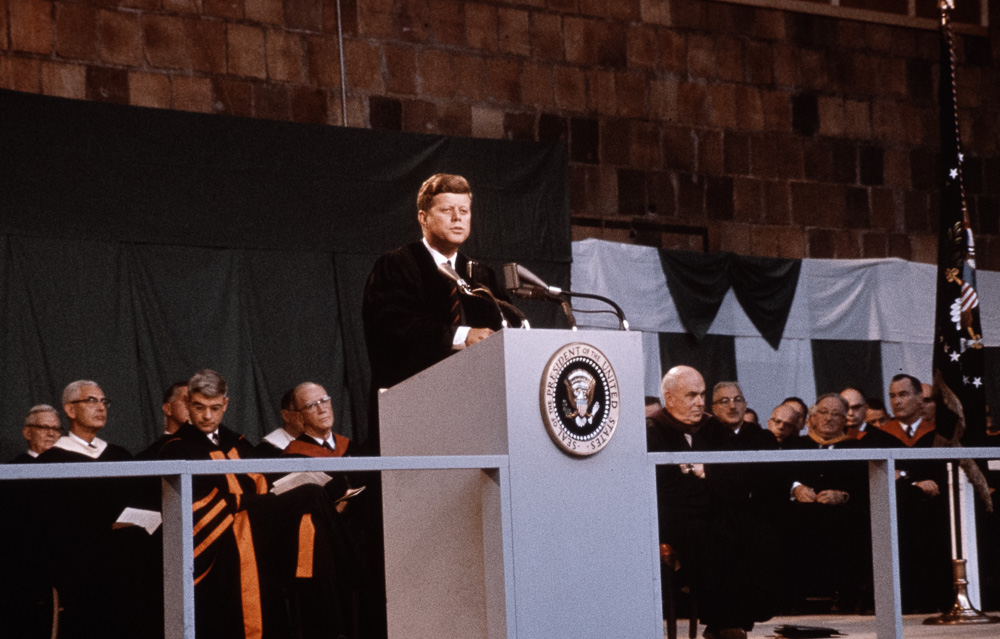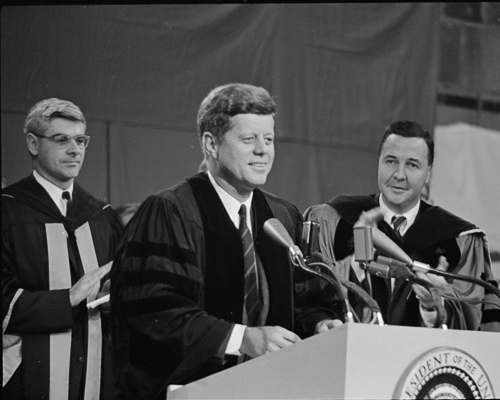Reflections on the significance of President Kennedy’s speech:
The speech was electrifying to me ..[it] went right to my core. It was the idea of public service. And I realized that I was in a very unusual and special position, and I should try to serve. – Steve Downs, Amherst ’64
One of the things that was so striking about what he said at Amherst on that day is how it resonates with the problems that our country is facing today. – Joseph Stiglitz, Amherst ’64
Kennedy’s use of language, his appeal to fundamental democratic ideals, his emphasis on the responsibility that comes with freedom, and his opposition to hate were, for me, a kind of poetry that countered hatred’s destruction of language and thought. – Biddy Martin, Amherst College President
National purpose included the cumulative contributions of artists, writers, and poets… The idea [of the liberal arts] was freshened and vastly reinforced in the speech of this sitting president at the height of his powers. – Rip Sparks, Amherst ’64
The people of this countryside may forget in ordinary human course what anyone says on this occasion, but they will remember, for many, many years that a young and gallant President of the United States, with the weight of history heavy upon his shoulders, somehow found time to come to our small corner of the world to talk of books and men and learning. – Archibald MacLeish, Honorary Doctor of Laws, Amherst ’64
I have come to believe that the key to [the Frost-Kennedy] relationship was a deep, broad exposure to, and respect for, the liberal arts. They could both speak lucidly about history and power, art, and poetry. They both understood responsibility in human relationships. – Mark Sandler, Amherst ’64
Kennedy’s speech captured me. It wasn’t just the elegance of his words or the eloquence of his delivery… His words passed through my mind, reached my flesh. I felt disquietude, a deep, visceral connection. His words lit a fuse. Though I did not recognize it at the time, the arc of my life’s journey had just been set. – Ted Nelson, Amherst ’64
Both [Frost and Kennedy] were restless thinkers, rooted deeply and stubbornly in this New England soil. Both were lifelong students of the experience of ordinary men; they were explorers of the space between lofty vision and humble experience, between big dreams and hard realities. Neither aimed to proselytize or preach. Both strove simply to connect with our most basic humanity, our wants, our needs, pains and promises. In this shared effort, the poet and politician found common cause and mutual admiration for the other’s art. – Congressman Joseph Kennedy III, Great-Nephew of President Kennedy2
When Kennedy spoke, he spoke to me … My generation has the ability to help the next generation embody what I think Kennedy was trying to embody for us. And if we don’t do that, I think we will have missed an opportunity. – Peter Rubinstein, Amherst ’64
Frost and Kennedy saw the political arena as requiring an artist’s touch, including the artist’s strength of character. Those most fit for statecraft had a breadth of education that encompassed all the liberal arts and sciences. They could be trusted to see clearly, to balance extremes…
Kennedy had a remarkable ability to encourage young people … and I think his death set for us an agenda to become involved. – Robert Benedetti, Amherst ’64
On that October day, I hoped that President Kennedy would deliver some version of Dr. King’s “Dream” speech, that he would vindicate us who at the time may have been considered by some as “rabble rousers.” Kennedy spoke to our questions about a common future. He challenged us to recognize our responsibility to the “public interest” by giving the best of all of us “to make it possible for Americans of all races and creeds to live in harmony, to make it possible for a world to exist in diversity and freedom.” He gave a “Dream” speech, after all. – James Giles, Amherst ’64

